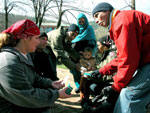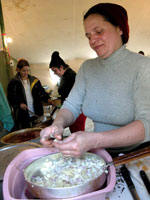

Margarita (back)
and María del
|
Crossing the Kohala bridge is almost
a privilege. Its magnificence is really eye-catching, the beautiful
mountains around it notwithstanding. How much history may be hidden
in this fabulous work of engineering that marks the boundaries
between Pakistan and Kashmir! However, Kohala is just the starting point of the road to Dirkot, a small village in Kashmir where the grass is still dry and the trees have no leaves. They say that by March all things now yellow and pale will turn green, and then the landscape will be more overwhelming. We arrived under a fine, if persistent, drizzle, but only on foot can one get to the camp where our doctors live, a short trip that proves uncomfortable because of so much mud. As usual, our welcome takes place in the kitchen, a wide tent that has become a favorite place for Estrella Suárez, the cook who has settled down right next to it “to begin my job very early”. It’s getting dark and some are playing dominos while others taste the delicious rice pudding Dr. Idalmis Bubaire made, though she admits that she can do “much better” back home, in Contramaestre, Santiago de Cuba province. The conditions are no different from those in other Cuban Integrated Field Hospitals, except that in Dirkot – several tents fell down as a result of an early-year snowfall – they are using a healthcare facility that was there already, where a doctor and five other people, all Pakistanis, used to work. Located very near our doctors’ and paramedics’ quarters, there’s nonstop coming and going. Noticeable is the atmosphere of work and unity among this group of 64 collaborators who live in a camp under the utmost rigor of surgeon Rafael Cuan, from Camagüey province, whom many extol, though they are perhaps unaware of how much he cares for them. “The fact that our Commander personally gave us this mission makes it special,” he said. “We are very pleased to be here, and wouldn’t hesitate in coming again if need be! As to me, I’d choose this troop over again. All of them! I’d leave out not one!” Such is the spirit at Dirkot, a hospital where more than 20,000 patients have been attended and 134 surgical operations have been made. Anyway, the story of these men and women didn’t begin in this Kashmir village but in Birpani, another town 90% of which was devastated by the earthquake where they stayed for about two weeks before they were compelled to leave since, among other reasons, there was no drinking water. “For a whole night, at two degrees of temperature, we worked to clear camp,” added Cuan. We slept together in a single tent, and the following day we went to Dirkot. It was December, and the journey took three hours. The first thing we did was to put up a kitchen and then the women’s dorm. In twenty-four hours we managed to be ready to offer hospital services.” Early-year snowfall brought down almost everything, but they all still remember the event, from newly-graduated Yisel Rodríguez and Karina Morlot to others with vast experience like Margarita Suárez and María del Carmen Rodríguez, both from Granma province’s Bayamo municipality, for whom Pakistan is a dream come true, maybe one of the most touching dreams they have ever had. “It hurts when I see the Pakistanis’ sad looks, they all have it,” said Margarita as she teaches laboratory techniques to Syed Sheraz, unrivaled in his task, as the only hospital staff member in charge of taking blood and analyzing sputum plates to check for tuberculosis. Today, the Cubans in Dirkot, and elsewhere, are worshipped rather than just loved. They have received Allah’s grace, a blessing of life. Yisel and Karina, as well as Integrated General Doctors Idalmis, Juan Carlos Hung and Osmany Rodríguez, are aware that it is an irrevocable reality. “A short time ago, a family returned with a girl who had been born here,” said Idalmis. “She had convulsions and a very high fever. Her father was desperate and we almost had to force him to take her away, for we don’t have special neonatology equipment. It was quite a fight because he was adamant in his refusal until the last minute, knowing he would find no love like ours for her little girl no matter where he went.” Although a veteran when it comes to medical missions, young Osmany is amazed at Pakistan’s beauty and impressed about what young people and women can do even under tough weather conditions further worsened by height. “In this piece of land in Kashmir,” states this man from Guáimaro in Camagüey province, “we have learned that human beings have no limits, and that kindness, humanity and devotion make things possible, so much so when it is as noble a cause as that of helping people in need, either as a result of an earthquake or a long-standing lack of attention. I feel quite committed, due to the fact that working in these conditions where primary and secondary healthcare is so closely-linked and determination runs so high, is really encouraging.” All testimonies are interesting, but night is falling in Dirkot. There are no stars in the sky, but thousands of little lights flickering in the mountains. Everyone’s boots have been left outside Osmany’s tent. It’s sacrilege to enter with them on, what with so much mud all over the place. It’s late, however no one’s sleepy and all prefer to keep telling anecdotes. Juan Carlos seals the night with a poem which he wrote and now reads aloud: Who said no
for fear of cold weather,
|


